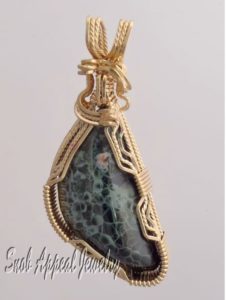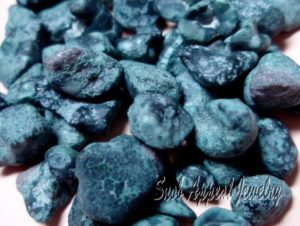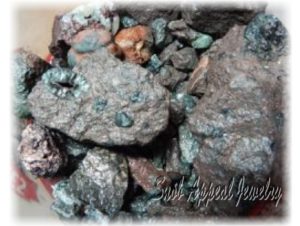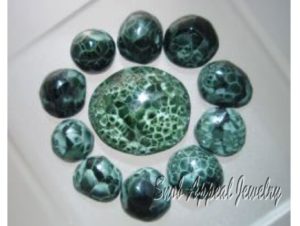
Piles of mine waste rocks used to abound in the Keweenaw. Not so much anymore. There’s a lot of Greenstone here, but where are they?
Let’s look at some interesting tidbits about Michigan Greenstone, the state gem.
After lobbying by the Michigan lapidary community, Isle Royale Greenstone (Chlorastrolite) became Michigans Official State Gemstone on February 21, 1972. Gov. William G. Milliken signed a bill that had rapidly sped through the legislature with overwhelming majorities.
Reportedly the lawmakers had some smart remarks to make before they were finished. One Senator from Kalamazoo (Anthony Stamm), said It looks like stuff I put on my driveway at $40 a load. Another legislator wanted to know if Chlorastrolite was any relation to the stuff that clogs arteries.Another lawmaker explained If you think my wife is going to trade in her Diamond for a Greenstone, you have rocks in your head.
Chemically Chlorastrolite is Hydrous Calcium Aluminum Silicate. It commonly has a polygonal mosaic pattern sometimes referred to as an alligator pattern. It can be light or dark green, but the pattern is much showier in lighter shades. Lighter green predominates Greenstones from Isle Royale, while many Keweenaw Greenstones are darker. A desirable Greenstone trait shows radiating lines exhibiting Chatoyancy like Tiger-eye.
A solid Greenstone has a hardness of 5.5 to 6.
Chlorastrolite is formed in vesicles (small holes in bubbly Botryoidal lava) in the upper strata of the lava flows. In many cases in the Keweenaw, the vesicles do not completely fill, and you get hollow nodules. Imagine cutting a large Greenstone, thinking how big and splendid and special it is, plus how much money it might be worth, and all of a sudden, you bust through to a hollow center. Everyone that cuts quantities of Greenstone has done this. It’s very frustrating indeed. I will leave out the expletives uttered when this happens.
On the other hand, sometimes a hollow core may have been later filled with another precious mineral found in this area–Thomsonite, Prehnite, Datolite, or even Copper. These elicit a WHOOP! sound from me. I have even seen hollow Greenstone with copper crystals inside. (For more on my favorite Greenstones with inclusions read The Shades and Patterns of Greenstone (Chlorastrolite) May 1, 2016
A Greenstone found underwater off Isle Royale in1961 by Arthur Vierthaler is in the Smithsonian and is claimed to be the largest Greenstone ever found at one and a half inch by three inches. I have seen many larger, and have personally cut a two inch by four inch one myself.
Shall we go way back in time? In the 1890s to the 1900s Isle Royale Greenstones started to appear in New York City. Socialites assumed they were of French origin because of the name. These ladies were somewhat lacking in geographical knowledge, and although there was minor interest in stones from romantic France, when it was found they were from a remote Island in Lake Superior, interest waned. Michigan Greenstones were relegated to the curio category and only had a passing interest.
Greenstones had more recognition in the Midwest where they could be purchased at Wisconsin and Northern Michigan barbershops and saloons. Today, Greenstone dealers still do not get the customers for Greenstones that they warrant. Because Michigan Greenstones come from such a limited area of the world, few people have ever seen one. They are basically a one source gemstone and that source is the Isle Royale National Park, (where they’re illegal to remove), or in the Keweenaw Peninsula, where they’re becoming more scarce because of all the Private property and all the old dump piles having been crushed and hauled away for road fill.
Michigan Greenstones may resemble several other vesicle-filled stones that are found in these areas. These nodules can be Chlorite balls, Chlorite covered shot copper, Copper agates, Greenstones, or other things. We may find what we call Greenstone Wanna-Bes. On the outside these appear as if they may be Greenstones, but when we grind them, they become green dust or mud. They just didn’t get fully baked by the geologic forces I guess!
Over the years I have accumulated not only vast amounts of Rocks, Minerals, and Fossils, but occasionally when I purchase an old collections from an Estate or garage sale, I also see old rock books or, if I am lucky, some notes or historic data on rocks and minerals.
Years ago I visited an estate sale of a well known Geologist/rockhound and discovered a couple boxes of documents, maps, notes, articles, and books no longer in print. To me, these are just as valuable as any rocks I might find. These papers and books contained secret locations, historical data, and many, many other valuable resources. I cannot explain you how excited I was to find these boxes; even more excited then finding that bonus fry or three on the bottom of the McDonalds bag.
I started to dig through these boxes and other archival resources and see what tidbits I could find on Chlorastrolite (AKA Greenstone). I know I have written about Michigans State Gemstone many times, but I am always looking to find something new from the old articles. Much of the information in this blog is from my treasure trove of old resources.
The Chlorastrolite Now Michigans Official Gem by E.W. Courter Lapidary Journal November 1974
Footnote on Chlorastrolites by Lee Carter Lapidary Journal October 1969
Other information delved from papers of the late Don H. Clarke
At Snob Appeal Jewelry we sell high-quality, hand-crafted, wire-wrapped stone jewelry specializing in stones from the Great Lakes Area. You can see our Michigan Greenstone cabochons and jewelry, Lake Superior Agate jewelry and other Keweenaw stones, Petoskey Stone jewelry,and stone and agate jewelry from around the world.











